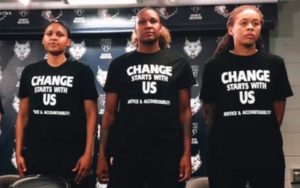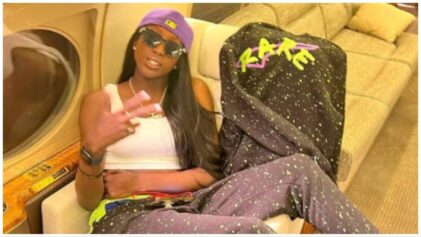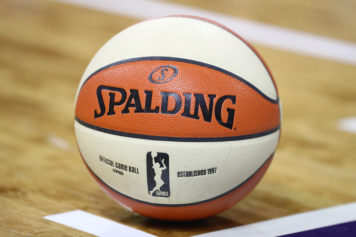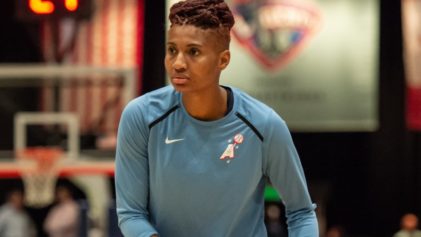
Minnesota Lynx
When is it acceptable for athletes to be political and to engage in protest? The recent example of pro-Black Lives Matter protests by WNBA players—and the charges of hypocrisy around responses to the political statements–raises the question.
Players in the all-women’s basketball league have decided to wear black T-shirts that read #BlackLivesMatter and #Dallas5, in memory of Black people killed by police—most recently Alton Sterling and Philando Castile–and the police killed in the recent Dallas mass shooting.
While the WNBA commended the players for their “passionate advocacy,” they nonetheless fined the New York Liberty, Phoenix Mercury and Indiana Fever $5,000, with a $500 fine for each player. At a recent Minnesota Lynx game, four off-duty police officers working security walked off the job in protest of the T-shirts demanding “justice and accountability.”
As ESPN reported, the players sought league approval, but the WNBA was slow to respond, so the women took matters into their own hands. In a league that is 70 percent African American, these Black women are touched by police violence, and want their voices heard. And they are not backing down.
Tamika Catchings, Fever forward and WNBA players’ union president, said the players were inspired by statements made by LeBron James and others at the ESPYs earlier this month. “I think it’s important that us as players being able to utilize our voice,” she said, according to USA Today. “And being able to basically stand united for what matters to us.”
Meanwhile, in contrast, the league praised players for wearing T-shirts and other activity in connection with the Orlando shooting that killed 49 in a nightclub. And the NBA, of which the WNBA is a sister league, made a recent decision to pull its All-Star Game out of Charlotte due to North Carolina’s passage of an anti-transgender bathroom law. The law, known as HB2, also undermines local and state governments in protecting against other types of discrimination, as NBC News reported. The law changed the definition of discrimination and requires people to pursue claims in federal rather than state court, and stripped city and county officials of their ability to set minimum wage levels for private employees.
Further, Omri Casspi of Sacramento Kings organized a delegation of NBA players to Israel, in a private jet owned by rightwing casino mogul Sheldon Adelson. As Dave Zirin wrote in The Nation, Adelson spent $70 million trying to unseat Obama in 2012 and has been propping up the rightwing Israeli government. The NBA trip financed by Adelson was an effort to counter pushes for Palestinian rights and a campaign of Boycott, Divestment and Sanctions (BDS) against Israel due to human rights violations. As Zirin noted, this is a time of increased solidarity between #BlackLivesMatter and Palestinian activists, as “police chiefs and high-ranking officers from across the United States—from Ferguson to New York City—have traveled to Israel for training in the arts of suppression.”
“Even though we’re in the middle of a conflict, whatever is going on, this trip wasn’t a political trip,” Casspi told CBS Sports. “It was a fun trip. We had a great time. That’s the most important thing.” Certainly, there was no punishment for these players, who participated in basketball clinics and promotional events during a trip that had everything to do with politics.
Sports leagues may very well invoke their right to protect their brand and look at the ways in which players may impact and reflect on that brand. However, when the rules appear arbitrary, and the response to protest over Black lives is so punitive, one must wonder if Black lives truly matter on the court or on the field, in the stadium or in the arena.
After the predominantly Black University of Missouri football team went on strike to protest on-campus racism and demand the resignation of the school’s president, white conservative Republicans in the state legislature introduced legislation to revoke the scholarship of any athlete who refuses to play “for a reason unrelated to health” as the St. Louis Post-Dispatch reported.
This country has witnessed what happens when Black athletes stick out their necks and stand up for Black lives. Muhammad Ali lost his heavyweight boxing belt and his license and livelihood when he refused to serve in the Army fight in Vietnam. Further, when U.S. Olympic medalists John Carlos and Tommie Smith, and Australian Peter Norman participated in the famous Black power salute at the 1968 Summer Games in Mexico City, they were ostracized and received death threats, and their careers ruined.
At a time of renewed protest and growing calls for justice for Black people, there is pushback and backlash against those who speak up and speak out. The Black athlete, by no means immune from the atmosphere of political protest and demands for social change, has been asleep until recently. And the limits of her endurance–off the court and in the movement– are being put to the test right now.


